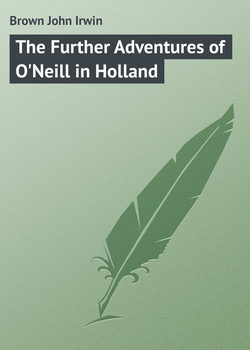Читать книгу The Further Adventures of O'Neill in Holland - Brown John Irwin - Страница 5
CHAPTER V
THE ‘COMPENDIOUS GUIDE’ ON DUTCH SYNTAX
ОглавлениеBoyton’s monograph on pronunciation is his finest piece of work. He never quite reaches that level elsewhere; and, if he is destined after a hundred and fifty years to achieve a name, it had better rest on his ‘Doctrine of the Native’ than on his Syntax.
So van Dam assured us, when our little party met in his room the week before Christmas.
We had all been busy; but busy or not, the Cape men found time to skim over Boyton’s entertaining paragraphs, as, indeed, we guessed, from the frequent guffaws and readings that reached us from time to time through the closed doors. To night we had accepted an invitation to supper, before the holidays; and we were to hear his views on O’Neill’s ‘Guide, Philosopher and Friend’, Boyton, – in other words the ‘Wegwijzer tot de nederduitsche taal’. Long since Jack had, indeed, got other and more modern manuals of Dutch, so that he was supposed to look now with a certain contempt on his former monitor: but the “compendious guide” had laid the basis of his erudition, and he had still a sneaking regard for its honest old pages.
NO DEFINITE RULES
What we wanted, indeed, was stories from Jack himself: but we had exhausted the more dramatic of these; and to get the fine aroma of the others – there were still many others – we thought some acquaintance with the compendium’s syntax was essential.
Van Dam had undertaken to put us up to any niceties he had been struck with.
The first thing he told us was that Boyton had no clear ideas of any sort, and never laid down any definite rule. This lent him a certain diffidence in regard to most points, – a diffidence which in the case of HET became positive fright. At the first mention of de, het, and an adjective, he gives as much encouragement as he can.
ALL NOUNS TO WHICH HET IS PREFIXED ARE NEUTER
It is not much.
An insurmountable Difficulty for the Englischman is the right use of the Particles, especially het. Sufficient rules cannot be given, E. g. het mooie kind: eene sterke vrouw, een zwart schip.
This is certain, that all Nouns, to which the Particles, het, dat, or dit, are added are of the Neuter Gender; on this account, the e final, in the Adjectives, when joined with such words, is, generally, rejected.
Even this rule admits of an exception. E. G. It is never said: een snel vogel: de groote paard. But it is correct to say, if the meaning admits it, een groote man. (also groot.) A native may be consulted with advantage.
When Boyton is labouring under strong emotion, the effect is always to increase the number of commas, colons, and other stops.
His agitation may also be traced in the way he harks back to any fundamental rule that he has already discussed ad nauseam.
DEN IS NOT A PURE NOMINATIVE
It is quite pathetic to note how he urges on his readers to reserve their dezen and dien and den for the accusative.
It is good Dutch to say: ik zag dien braven man gisteren, I saw that honest man yesterday; but it is very bad Dutch, – whatever custom may have introduced in some places; to say– dien braven man heeft het gezegd.
Take some gems at random.
N.B. Prepositions are that part of speech, which are so called because they are, commonly, put before the words, which are subsequent to them, as onder and ondanks.
N.B. Most Adverbs may be distinguished from adjectives by this rule: If a substantive is added after them, they will make nonsense; whereas, being joined to an Adjective or a Verb, they will make good sense.
“What I admire most,” said van Dam handing back The Work to O’Neill, “is the elasticity of the rules. He says, for instance, that you can render I know by ik weet, and on the whole he is inclined to recommend that way of it. But he never commits himself.
“It must be also admitted that there are other authors of good standing who employ the Subjunctive form where we might expect the Indicative and who say IK WETE, I know.”
IK GRAUW, IK KEF, EN IK KWEEL
That’s one of his rules!
As a matter of fact there is no finality about anything in these pages. O’Neill, you were in training for a poet when you took up this book. I confess I should have liked to hear you going over your fifteen classes of irregular verbs, on the model (say) of ik grauw, ik kef en ik kweel, or even of ik krijsch, ik piep en ik lieg.
There is a rich profusion of tenses too in Boyton. He needn’t have apologized for being too simple when he furnishes you with four ordinary optatives and four future optatives.”
A BOYTON TO THE RESCUE
“You may jest as you like about Boyton”, interrupted Jack; “but I tell you it’s a book that has points. Do you know it once helped me to save a lady’s life?”
“Save a lady’s life!” said the Professor and the Philosopher in one breath. “We’ll withdraw all we’ve said, if you’ll prove to us, now, that the ‘Compendious Guide’ was ever the least good to any human being.”
“Tell your adventure in your own way, O’Neill,” a boyish voice chimed in; “and shame the cynics.”
We all glared at the First-year’s man – who was making himself very much at home for a lad of his tender years – but as he had nothing more to say, we let him off with a look, and turned to the lethargic story-teller.
